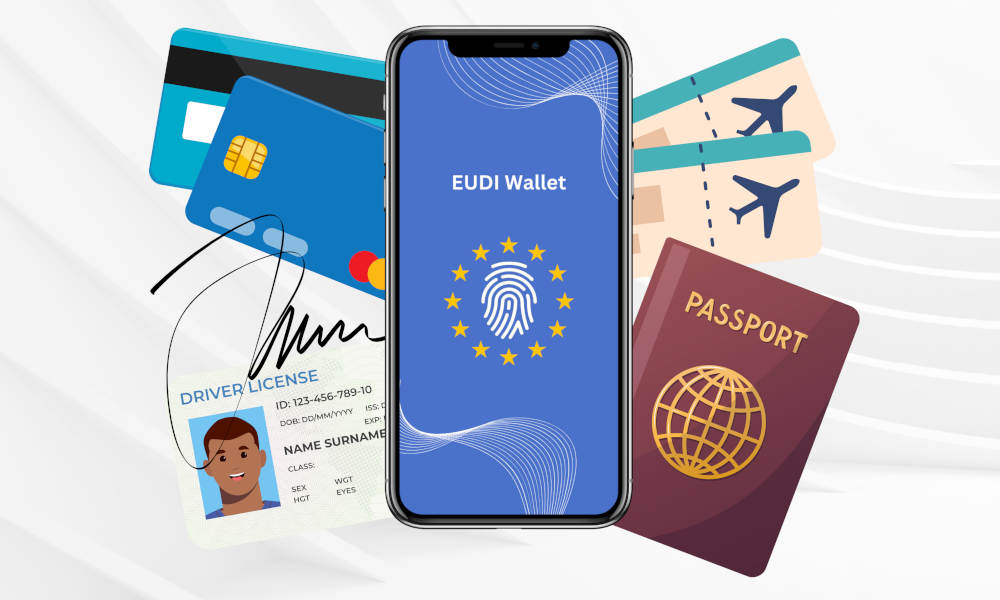Blog
The EUDI wallet: what you need to know.
13.02.2025

The European Union is moving forward with the introduction of the EUDI Wallet (European Digital Identity Wallet). This digital tool will not only enable EU citizens to manage their identity and important documents and attributes securely and easily online, but will also provide cross-border access to a wide range of online services in the member states.
What is the EUDI Wallet?
The EUDI Wallet is a digital platform that allows individuals and organizations to securely store, manage and use their identity for various electronic applications in the EU. It is a central component of the European digital identity system and is intended to facilitate access to online services. Users can utilize the wallet for numerous purposes, for example to store and share digital ID cards, driving licenses or professional certificates.
The European Commission plans to introduce the EUDI wallet across the board by 2026. Before then, the implementing acts, which form the legal framework for the wallet, still have to be adopted by the European Parliament and the Council. Pilot projects are already underway in several member states.
How does the EUDI wallet work?
A core component of the wallet - in addition to information about the identity of the user - are the so-called attribute certificates. These certificates contain further personal information such as confirmation of a university degree. For companies or organizations, specific features such as tax or commercial register numbers are added to these certificates. This identity information is issued by trusted institutions, such as public authorities, which guarantees its authenticity and integrity.
There are two types of attribute certificates:
- Qualified Electronic Attestations of Attributes (QEAA): These meet particularly high security requirements and must be validated by a qualified trust service provider such as A-Trust. They are suitable for applications that require a high level of trust. For example, your own university degree could be digitally verified directly when applying for a job.
- (Simple) Electronic Attestations of Attributes (EAA): These offer a more straightforward way of sharing information, e.g. for proving affiliations or certain qualifications.
It is important to note that it is always up to the user to decide which attributes should be shared with other people or organizations.
Further functions of the EUDI Wallet: Digital signatures & seals
In addition to identity management, the wallet also supports digital signatures and seals for documents. Natural persons can use digital signatures, while organizations can use digital seals. There are three security levels, though only the Qualified Electronic Signature (QES) or the qualified seal meet the highest legal standards. The QES or qualified seal can only be issued by qualified trust service providers and guarantee the authenticity and integrity of digital documents. The EUDI wallet therefore acts as a platform for secure digital signatures and seals, among other things.
In Austria, users already have access to a free QES for private use in form of ID Austria (formerly Handy-Signatur), which is actively used by large sections of the population.
Advantages for users
The EUDI wallet enables simple and secure access to digital services throughout the EU. Citizens always retain control over their data and decide for themselves what information they want to share with authorities, companies or other institutions. For example, they can authenticate themselves to use various online services, identify themselves digitally, sign digital documents in a legally secure manner, or save or forward certificates.
With the EUDI Wallet, the EU is creating a modern, flexible and secure identity system that meets the needs of citizens, authorities and companies alike. This system is intended to facilitate the cross-border use of digital services and take Europe a decisive step towards digitalization.
„Implementing Acts“ as a legal framework
Parallel to the introduction of the EUDI wallet, the EU is working on so-called implementing acts, which form the legal framework that ensures that the implementation of digital identity solutions is consistent and binding in all EU member states. These implementing acts set out clear requirements for the technical standards, security and data protection of the wallet. They oblige the Member States to provide interoperable and free solutions that can be developed by both public and private providers. At the same time, they define mechanisms for monitoring and enforcing compliance to ensure the security and integrity of the entire digital identity system. The Implementing acts thus not only promote the reliability of the EUDI wallet, but also people's trust in the cross-border use of digital identities.
Also of interest:
An extensive collection of FAQs on the wallet provided by the European Commission can be found here.


